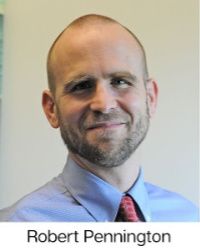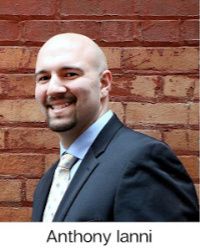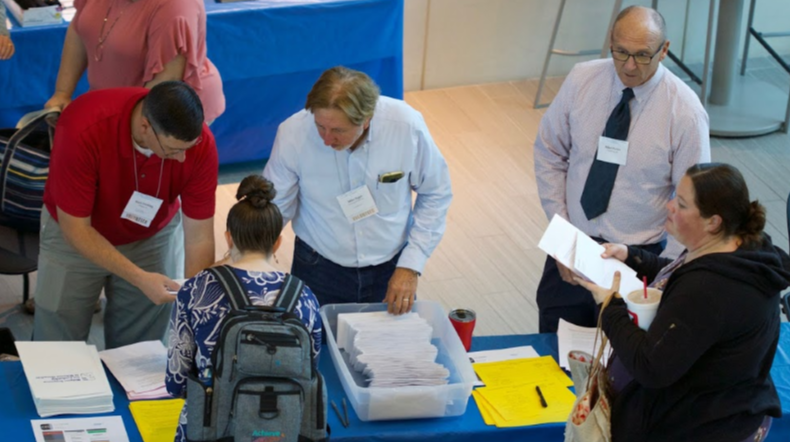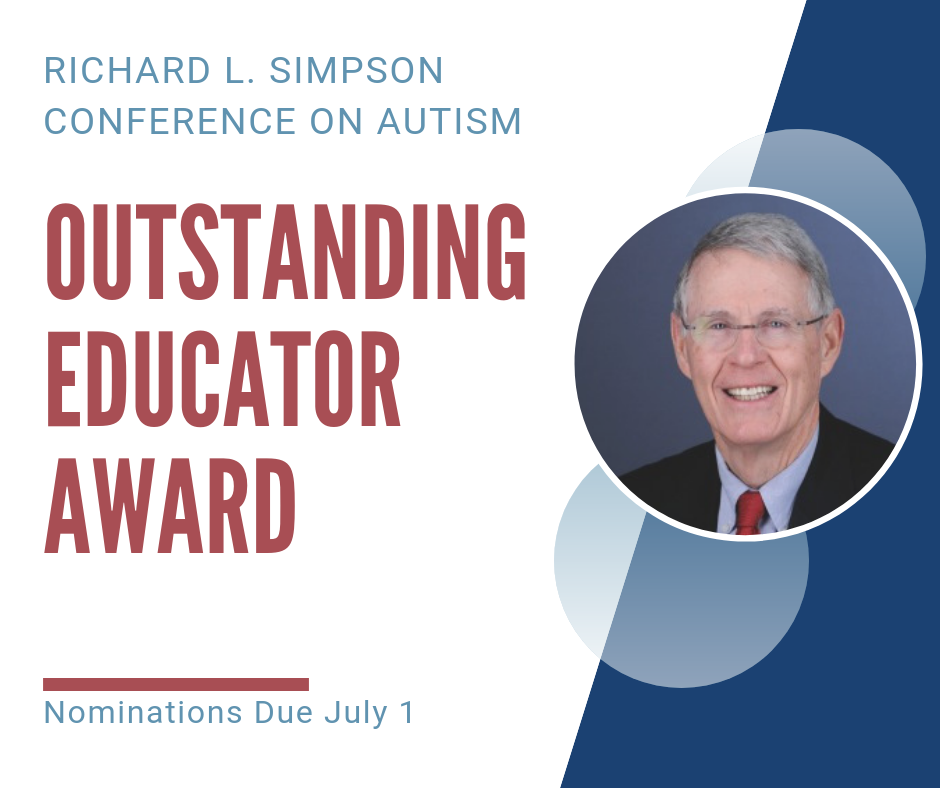2021 Virtual Richard L. Simpson Conference on Autism
Session videos are being processed and will be available through the conference organizer on Wednesday, October 13. They are located in the resource section of the Virtual Event Organizer (VEO) and with resources that have been linked for each session. Access to the VEO will be available through November 30 to registered conference participants.
Those seeking a Certificate of Attendance or a certificate for BCBA CEUs will be notified by email on or before Nov 15 with a copy of the certificate or directions to access the certificate.
Dates: October 7 & 8, 2021
Location: Virtual Online Conference
Sponsor: Midwest Symposium for Leadership in Behavior Disorders (MSLBD) & The Kansas Technical Assistance System Network (TASN)
-
Download detailed conference information and registration form
-
Become involved by nominating a deserving individual for their outstanding work on behalf of students diagnosed with autism spectrum disorder (ASD). Nominations Due July 1.
Keynote Sessions
-
Robert Pennington, PhD, BCBA-D, Lake & Edward J Snyder, Jr. Distinguished Professor in Special Education, University of North Carolina at Charlotte
(BCBA CEUs available)Thursday Keynote: Applied Behavior Analysis for Everyone: Scaling Up Lessons in Science and Compassion

Applied behavior analysis (ABA) is often misunderstood by educational practitioners, family members, and persons with disabilities. Despite its many contributions to the field of education, to some, it is considered an outdated set of rigid practices or a means to modify or remake an individual to fit the expectations of others. In some cases, these misconceptions have been perpetuated by behavioral practitioners that have failed to fully understand the complex contingencies within natural settings. In this session, Dr. Pennington will attempt to reframe ABA as a lens for compassionate observation of the world and will help participants discriminate between behavioral interventions and a broader behavioral practice. He will highlight how ABA can be used to promote dignity and higher quality of life outcomes in the field of education.
Robert Pennington, PhD, BCBA-D, Lake & Edward J Snyder, Jr. Distinguished Professor in Special Education, University of North Carolina at Charlotte
-
Anthony Ianni, BA, National Motivational Speaker & Autism Advocate, Michigan Department of Civil Rights
Friday Keynote: Relentless: Dreams, Goals, and Aspirations

I am on a mission to educate and inspire everyone to be “Relentless” and achieve their dreams and goals in life. In the last two years, I have reached 140,000 individuals in more than 200 schools, colleges, camps and summer programs all over the United States. My insight about autism – gained from my own lived experience as a person on the spectrum and more than 5 years of interacting directly with hundreds of thousands of individuals, young and old, on the spectrum and off – provide the basis of my message to families, caregivers, and the entire network of support available to individuals with autism.
Anthony Ianni, BA, National Motivational Speaker & Autism Advocate, Michigan Department of Civil Rights
Thursday Half-Day Workshops
Morning Workshops | 9:00 AM - 11:30 AM (choose one session)
-
Sonja de Boer, PhD, BCBA-D
WS.1A Functional Communication Training: Understanding, Changing and Improving Behavior in Children with Autism Spectrum Disorder (Full Day Session)
FULL DAY SESSION Functional Communication Training (FCT) is an evidence-based practice rooted in Applied Behavior Analysis intervention methods for improving behavior and making meaningful changes in the lives of children with ASD. All behavior has meaning and communicates a person wants or needs. FCT is useful when children engage in disruptive, aggressive, self-injurious or other challenging behavior as a means of communicating what they want or do not want. This session will overview a three-step process for FCT— errorless teaching, schedule thinning, & intermittent reinforcement. The session will use lecture, videos, and role playing to help participants learn the process for implementing FCT young children with ASD. (Intermediate, Advanced)
Sonja de Boer, PhD, BCBA-D, Director of Special Education, North Haven Community School, North Haven Island, ME
-
Matt Tincani, PhD, BCBA-D
WS.1B Interdisciplinary Collaboration: A Practicing Framework for Behavior Analysts and Special Educators (BCBA CEUs Available)
Training in interdisciplinary collaboration is seldom a formal component of applied behavior analysis training programs (Kelly & Tincani, 2013). Yet, practicing behavior analysts must frequently collaborate with non-behavior analytic professionals in a variety of service delivery contexts. In this workshop, Dr. Tincani will identify the components of effective interdisciplinary collaboration, explain the benefits of collaborating across disciplines, and describe strategies for behavior analysts and non-behavior analysts to successfully work together. The target audiences for this presentation are BCBAs and other special education professionals (e.g., teachers, speech-language pathologists, psychologists, medical providers) who frequently collaborate within interdisciplinary contexts. (Intermediate)
Matt Tincani, PhD, BCBA-D, Professor and Chairperson, Department of Teaching and Learning, Temple University, West Chester, PA
-
Multidisciplinary Teams from Auburn Washburn USD 437 & Northwest Kansas Special Education Service Center and Quinter School District; moderator, Dixie Teeter, MS, CCC-SLP
WS.1C From Border to Border - Can You Build it? YES, You Can! A Multidisciplinary Approach Implementing Evidence-Based Strategies through Collaboration
Yes, we built it and you can too. Witness the journey from the ground up as Kansas Educators across the state implement evidence-based collaborative practices to best serve students with complex needs. Learn how two teams improved student outcomes by constructing strong collaborative methods of assessment using structured teaching, intensive teaching protocols, and positive behavior supports to deliver specially designed instruction to support communication, academics, and functional skills. Our on-site crew consists of a Para-Educator, an Occupational Therapist, an Adaptive-Physical Educator, Speech-Language Pathologists, Special-Education Teachers and Autism Consultants from a rural and suburban district. (Intermediate)
Multidisciplinary Teams from Auburn Washburn USD 437 & Northwest Kansas Special Education Service Center and Quinter School District; moderator, Dixie Teeter, MS, CCC-SLP, State Trainer, TASN Autism and Tertiary Behavior Supports, Holcomb, KS
-
Leslie Bross, PhD, BCBA-D
WS.1D Autism After 18: Supporting Young Adults to Achieve the Quality of Life They Desire
Individuals with ASD face unique challenges during their transition to adulthood in the areas of competitive employment, postsecondary education, independent living, community integration, and building positive relationships. Young adults with ASD will share their personal experiences navigating the demands of adult life while also giving suggestions for enhanced quality of life for other individuals with ASD. Tips and suggestions for supporting transition-age youth with ASD to achieve their personal goals will be given. (Intermediate)
Leslie Bross, PhD, BCBA-D, Assistant Professor, University of North Carolina at Charlotte, Charlotte, NC
-
Mary Beth Patry, PhD, BCBA & Michelle Hass, MA, BCBA, LBA, CCC-SLP
WS.1E Providing Direct Instruction to Children with Autism and Developmental Disabilities in Inclusive Preschool Settings (BCBA CEUs Available)
This session will address specific methods of teaching discrete skills such as language and pre-academics to children with autism and other developmental disabilities in inclusive preschool settings. Specific topics will include appropriate skills to teach, methods for simple and user-friendly data collection, and strategies for fitting direct instruction into daily classroom routines. (Intermediate)
Mary Beth Patry, PhD, BCBA, Owner & Clinical Director and Michelle Hass, MA, BCBA, LBA, CCC-SLP, Owner & Program Director, Creating Connections Therapy, LLC, Prairie Village, KS
Afternoon Workshops | 1:15 PM - 3:45 PM (choose one session)
-
Sonja de Boer, PhD, BCBA-D
WS.1A (Two Part Session) Functional Communication Training: Understanding, Changing and Improving Behavior in Children with Autism Spectrum Disorder (Full Day Session)
FULL DAY SESSION Functional Communication Training (FCT) is an evidence-based practice rooted in Applied Behavior Analysis intervention methods for improving behavior and making meaningful changes in the lives of children with ASD. All behavior has meaning and communicates a person wants or needs. FCT is useful when children engage in disruptive, aggressive, self-injurious or other challenging behavior as a means of communicating what they want or do not want. This session will overview a three-step process for FCT— errorless teaching, schedule thinning, & intermittent reinforcement. The session will use lecture, videos, and role playing to help participants learn the process for implementing FCT young children with ASD. (Intermediate, Advanced)
Sonja de Boer, PhD, BCBA-D, Director of Special Education, North Haven Community School, North Haven Island, ME
-
Lori Chambers, MS, CCC/SLP & Mary Pat Brun, MA
WS.2B Let's Play! Developing Social Skills for the Young Child
For the young child, play is the foundation for developing lifetime social competencies. This session offers a look at using evidence-based child-centered activities to explicitly teach play skills resulting in improved social competence. A discussion of foundational steps will provide participants insight into the role adults and peers have in fostering play, communication, and social engagement. (Intermediate)
Lori Chambers, MS, CCC/SLP, Regional Systems Coordinator, TASN Autism and Tertiary Behavior Supports, Kinsley, KS and Mary Pat Brun, MA, State Trainer, TASN Autism and Tertiary Behavior Supports, Wichita, KS
-
Pamela Neidert, PhD, BCBA-D, LBA
WS.2D Child Compliance with Healthcare Routines (BCBA CEUs Available)
Child noncompliance during healthcare routines (e.g., dental exams) can be a serious problem, particularly when a routine involves the use of sharp objects (e.g., scissors, dental scrapper). After finding a high prevalence of the problem in our early intervention program, we evaluated a reinforcement-based training procedure (with and without extinction) for compliance with several healthcare routines. Training occurred in a simulated context, and probes were conducted periodically to evaluate compliance in the absence of treatment and generalization to novel therapists. Additionally, compliance was assessed periodically in the actual relevant environments to assess the extent to which training effects generalized. Several children required only exposure to the training environment, but training was required for the majority of children. Complete generalization to the actual environment was observed for a limited number of children. However, dramatic decreases in screaming and the use of restraint were observed for most children. Results will be discussed in terms of treatment effectiveness, advantages and disadvantages of extinction, and programming for generalization to actual healthcare settings. (Beginner, Intermediate)
Pamela Neidert, PhD, BCBA-D, LBA, Associate Professor, University of Kansas, Lawrence, KS
-
Jessica Simacek, PhD
WS.2D Decreasing Barriers to Intervention through Telehealth: AAC Implementation for ASD and Complex Communication Needs
Children with autism who experience complex communication needs (CCN) can experience barriers to intervention, due to a shortage of providers with expertise in Augmentative and Alternative Communication (AAC). Telehealth is an intervention delivery mechanism to connect children with intervention. This half-day workshop will provide an overview of telehealth use to support AAC for children autism and CCN, including different forms of telehealth modalities. The workshop will also include activities to support interventionists to implement telehealth for AAC: 1) Viewing and scoring fidelity during telehealth example videos, 2) Planning for the initial set up of telehealth technology through initial planning checklists for the organization providing the intervention (the “tele-interventionist” end) and the recipient of the services (the “tele-user” end). 3) Planning for intervention delivery and fidelity monitoring of the intervention. (Intermediate)
Jessica Simacek, PhD, Research Associate, Director, University of Minnesota, ICI Telehealth Lab, St Paul, MN
-
Melissa Woods, LSCSW & Lee Stickle, MSEd
WS.2E The Intersection of Autism, Trauma, and Problematic Behavior
Those who work with, provide care for, and interface with those on the Autism Spectrum are increasingly facing more and more complex issues. Relatively new in the research and the field, is the awareness of ASD co-occurring with trauma. Research tells us that people with disabilities disproportionately face maltreatment. While having an awareness of this issue is a step to becoming trauma-informed, we know that becoming trauma-informed is a process. This session is designed to review the research on trauma and to look at the research on trauma and ASD. While knowing the facts is critically essential to moving forward in the process, one must ask the big question, “So what?” Specifically, how will having this information about my students impact the way I engage with them? Does my behavior need to change to create a positive rapport with this child? What strategies might I use to reduce the odds of my student escalating into action that is not safe for them or others in their environment? Join us for this session to be a part of the discussion and part of the identifying solutions. (Beginner, Intermediate)
Melissa Woods, LSCSW, Behavior Consultant, TASN Autism and Tertiary Behavior Supports, Wichita, KS and Lee Stickle, MSEd, Director, TASN Autism and Tertiary Behavior Supports and Director, School Mental Health Initiative, Kansas State Department of Education, Lenexa, KS
Friday Breakout Sessions
-
-
There will be three concurrent sets of sessions with five-session offered each hour. See the detailed event brochure for full details or the event website.
Conference Overview
Thursday
| 8:45 am | Welcome & Opening | Online Meeting |
| 9:00 - 11:30 am | Workshops | Multiple Online Meeting Rooms |
| 11:30 am - 12:00 pm | Lunch | |
| 12:00 - 1:00 pm | Keynote Session 1 with Robert Pennington | Online Meeting |
| 1:15 - 3:45 pm | Workshops | Multiple Online Meeting Rooms |
Friday
| 8:45 am | Welcome Day Two | Online Meeting |
| 9:00 - 10:00 am | Concurrent Breakouts Set 1 | Multiple Online Meeting Rooms |
| 10:15 -11:15 am | Concurrent Breakout Set 2 | Multiple Online Meeting Rooms |
| 11:15 am - 12:00 pm | Lunch Break | |
| 12:00 - 1:00 pm | Concurrent Breakout Set 3 | Multiple Online Meeting Rooms |
| 1:15 - 2:45 pm | Keynote Session 2 w/ Anthony Ianni & Awards Presentation | Online Meeting |
| 2:45 | Adjournment |
Outstanding Educator Award
Midwest Symposium for Leadership in Behavior Disorders will annually recognize an individual at the Richard L. Simpson Conference on Autism for outstanding achievement and excellence in classroom service to students diagnosed with autism spectrum disorder (ASD). The recipient will receive expenses to attend the conference in order to receive the award in person. Award criteria and requirements for the nomination are available here.
Deadline: July 1


